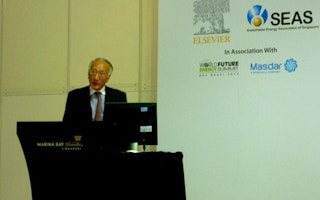The former head of the International Energy Agency, Nobuo Tanaka, is not ready to count nuclear energy out of a future Asian energy mix, particularly in light of waning American interest in the Middle East.
In his opening keynote address at the Asia Future Energy Forum in Singapore on Tuesday, Mr Tanaka said it was doubtful that the world - and Japan in particular - would be able to meet energy security goals without nuclear power.
With its growing demand for oil, Asia would be especially vulnerable to potential petroleum supply disruptions in the Middle East, where Iran is currently threatening to block access for oil tankers through the Strait of Hormuz (see sidebar).
North America will achieve energy independence in the near future, which may prompt the US to decrease its defensive presence in the Middle East, said Mr Tanaka.
He added that a major disruption in the Strait of Hormuz could lead to oil prices of up to US$160 per barrel, triggering a severe crisis in Japan. Without nuclear power to diversify the energy mix, Japan’s federal deficit may reach 12 trillion yen, he said.
Japan was one of several countries that committed to phasing out nuclear power following the 2011 Fukushima nuclear disaster, and currently only two of its 50 nuclear plants are operating. Nuclear plants generated 30 per cent of Japan’s electricity prior to the disaster.
To make up for the loss, Japan has increased imports of fossil fuels such as natural gas, and introduced policies to boost renewable energy development.
“I am sceptical about the feasibility of this plan. It is good to develop renewable energy for energy security, but it’s costly,” said Mr Tanaka, who is currently an associate for energy security and sustainability at Japan’s Institute of Energy Economics.
The new feed-in tariff (FiT) that the government introduced in July, which mandates that utilities purchase solar energy at a cost premium for the next 20 years, is the world’s highest at 42 yen per kilowatt-hour.
While expensive, the FiT is having an impact: Solar could expand by 2,000 megawatts by the end of March, according to the Ministry of Economy, Trade and Industry.
Natural gas also comes at a cost premium, noted Mr Tanaka, explaining that Japan’s gas prices are about 5 times higher than in the United States and twice as much as in Europe. He further noted that, while global natural gas supplies are expanding because of recent technologies such as shale gas extraction, global demand is ramping up as well.
For Japan – and the rest of Asia – to reduce gas prices and improve energy security, Asia will need better physical connections between its various energy and electricity supplies, he said, pointing out that connectivity allows Germany to phase out nuclear energy “because it can always import electricity from neighbours in shortfall”.
Mr Tanaka said that Europe as a region has achieved relative energy security because of the diverse energy sources it can access using connected electricity grids as well as oil and natural gas pipelines.
To further diversify, Europe has been working on extending its grid connection to North Africa and the Middle East in a project known as Desertec.
Asia could also create such a “super-grid” incorporating new and existing pipelines within Asia as well as pipelines from Russia, he told the 200 policymakers, industry players and thought leaders attending the forum.
In the absence of a growing nuclear industry, Mr Tanaka said, new technologies such as hydrogen fuel and storage systems, and super-conductivity transmission lines – which do not lose power over long distances – were key. However, he added that the region would also need natural gas to fill the gap and would need to invest in carbon capture and storage (CCS) to sustainably use its ample supplies of coal.
Even with such innovations, Mr Tanaka thinks that nuclear – in newer and safer models – will persist, in part because of its role in reducing Europe’s dependence on Russian gas.
“I believe nuclear will continue to play a major role in the world…It will be necessary to convince the public that there are (safer) alternatives in nuclear power,” he said.

















